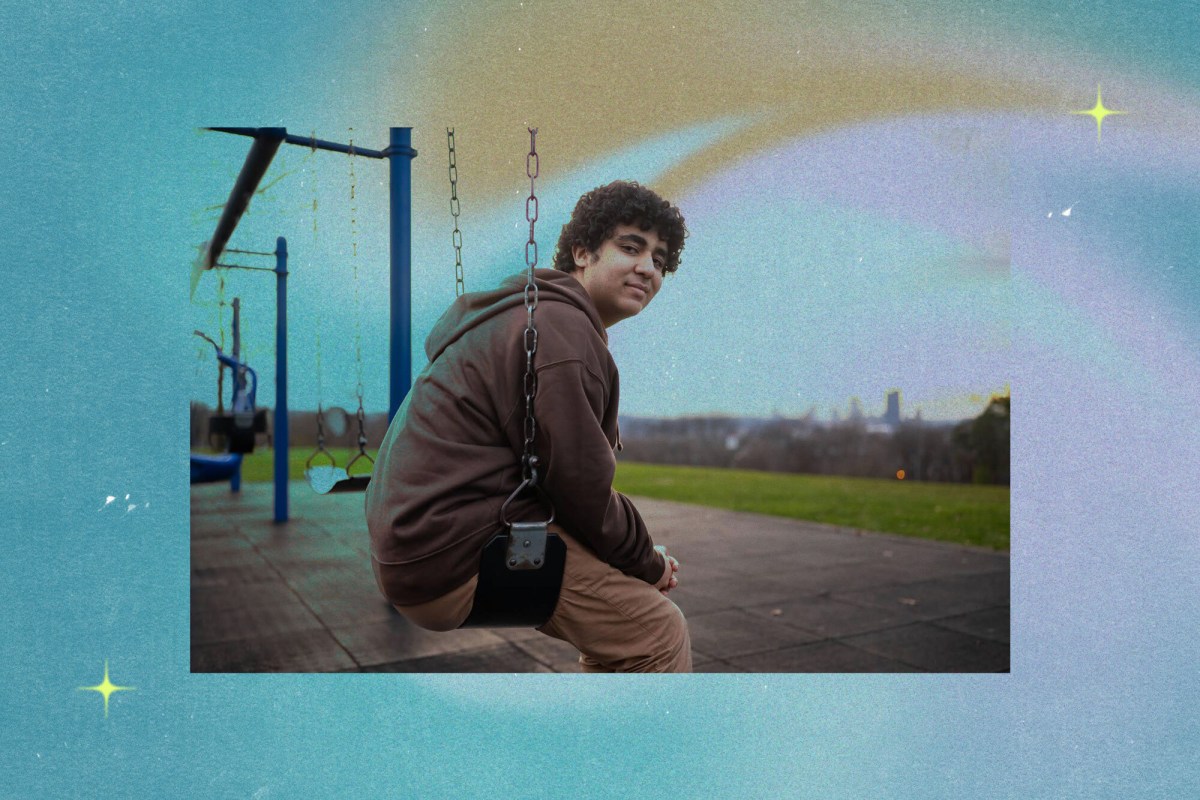For some young people, an intercultural exchange is rare and there is little consideration of why they are who they are. But for teens who immigrated or whose immediate family immigrated, it can be a major cornerstone of their experience and identity. This week, we speak with Pittsburgh Allderdice High School senior Sam Alawadhi on the challenge and gifts of having intersecting identities — as a Yemeni and an American — and what he thinks about his peers’ understanding of the concept of culture.
TRANSCRIPT
Sam: My name is Sam Alawadhi. I am a senior at Allderdice High School. Shout out, Allderdice! … I am Arab. I identify as Muslim, though I’m not the most religious.
I am a student. I am an immigrant, a first-generation immigrant. I am French born, but technically from Yemen. Yeah, so those are my identities.
Jourdan: Think of Sam as a friend of a friend. Our guest from the previous episode, Amaya Doman, introduced him to From the Source. Sam and Amaya are in the same graduating class at Pittsburgh Allderdice. Amaya suggested Sam share his thoughts with us on the pressures that teen immigrants face.
I’m Jourdan Hicks. This is From the Source.
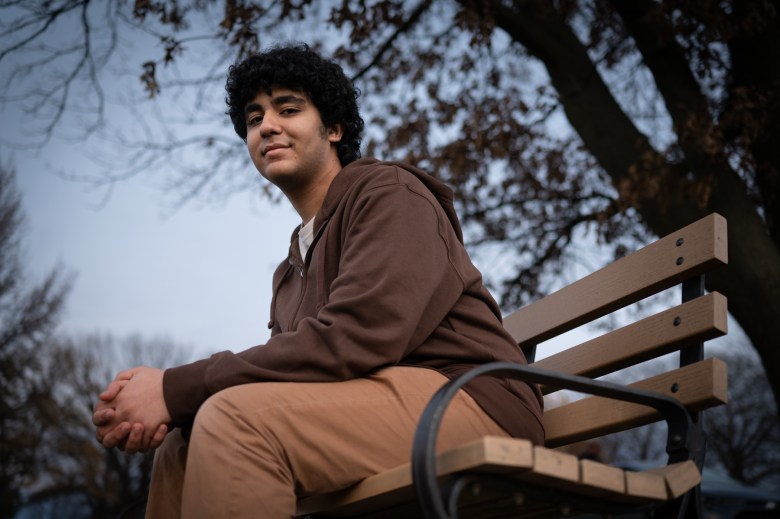
Jourdan: Sam says teens have so much going on that it can be hard to recognize the impact of their intersecting identities, much less take pride in them.
Sam: I feel like it’s so easy for teens to kind of forget about it, especially with like the climate right now, like whether it’s political or whatever it is, it’s kind of easy to forget yourself and forget your roots and kind of be pressured to be the same and not stand out much.
So, yeah, I feel like because it’s, it’s so easy to happen to teenagers, especially because they’re still trying to figure out who they are. So it’s like a perfect time for others to just kind of be like, no, like, just be like everybody else.
Jourdan: One subtle example of the way society ignores the Arab experience — those race and ethnicity questions on the census and college applications.
Sam: On the census and U.S. government papers, you know, the place where you pick your race or ethnicity is always like, it’s white and then in parenthesis, like including Middle Eastern origin. And I’ve always thought that was so weird because yeah.
Like the Arab world, it’s very diverse. People come from Asia, from Africa, from Asia, uh, from Europe. There are like white Arabs, but it’s mainly because of like history and colonialism.
Jourdan: Sam was born in Paris. His dad, Hamid, worked as an UNESCO ambassador representing Yemen. UNESCO is the United Nations Educational, Scientific and Cultural Organization. His mom, Amat, worked as a teacher and social worker previous to the family moving to Paris. Living in Paris, Sam’s world was naturally multicultural. Sam’s family moved back to Yemen when he was 3 years old. In 2014, civil war broke out in Yemen.
Sam: I remember the night that, like, I guess the war officially started, there had been tensions already. My sister got up and she took me out of bed and then we went down to the basement.
I remember this really bad night where everybody was just kind of huddled up. Because I was 9 I was like, I’m just going to sleep and hope for the best and wake up the next day fine, hopefully.
But yea, I’m here now, so…
I still like, to this day, I’m kind of like, I don’t wanna say desensitized, but every time somebody mentions it or like, says like, how has that impacted you? I don’t feel like I’ve had any major trauma from it. I’ve only grown from it. I feel like that’s a very big aspect of my life and I’d be lying if I said that’s not a big part of me.
But the war, it’s the thing that made us come here and it’s kind of like my entire rest of my family is back in Yemen and I really want to go back and visit one day.
Jourdan: When they arrived in the U.S., they moved in with Sam’s aunt and uncle. Sam would have to help his parents integrate.
Sam: I think a lot of families, like, who came here maybe put the pressure on their children to know the society and become one with the society because the parents don’t know what’s going on. They need their kids to translate for them or they need kind of to teach them the culture here so they don’t look out of place.
Jourdan: The U.S. wasn’t quite like Sam expected it to be.
Sam: Like you hear stories from people that came here like, oh, it’s the best place to immigrate. Like the American Dream is like this thing that I like. I remember when I came here, like the American dream was like a thing that I learned about. I was like, that’s so crazy. But now that I look at it, I’m like, why do people talk about the American dream?
You know? ’Cause it’s not. The idea is good, but like if you’re not of a specific race or you don’t look a certain way, it doesn’t work for you. You know? And you kind of have to make your own name here. You would have to do it regardless, but like there’s so, there’s so many battles that you kind of have to go through that you wouldn’t realize.
Like you think that like I used to think America was this oppression-free place like where bullying did not exist. Because I remember I was in school and I would like get bullied in Yemen and I’m like, oh my God, I can’t wait to go to America because like, that doesn’t happen in America. But it very much does and it’s kind of, it is like worse than it was in Yemen.
And I was like, so this is not what I thought it was. Yeah.
Jourdan: Sam says the pressure to be his Yemeni self and define his new self in America was a prominent concern for him.
Sam: When I first came here, to be honest, because I felt this pressure, like fifth grade especially, I’m like, I have to be like these people. These people are gonna think I’m a freak if I’m not like, like them. So I was, I was like, I hate Arab music and Arab food. And like now that I think about it, I’m like, Sam, that’s so, that’s so annoying.
Jourdan: Are there certain expectations of you as a male in Yemeni culture?
Sam: Oh yeah.
Jourdan: What are they?
Sam: So, Yemeni culture, in Arab culture as a whole, the man is more of like he goes out and works, gets the money, and the woman stays in the house and cleans and cooks and does this for his children.
Like for me, I’m supposed to be like the tough one, like the strong one that’s supposed to like pick up the water that we bought from Costco and take it up the driveway that’s like a 45-degree angle because of Pittsburgh. But that’s the expectation. It’s very much like old-fashioned, like what you would hear. Well, it still, it still happens now, I’m not gonna lie, but it’s, yeah, it’s very much old-fashioned. Like, oh, the man provides and does the things that are not easy for a woman to do, like socially, like if you think about it in a social construct way, I guess.
Jourdan: Does that fit for you?
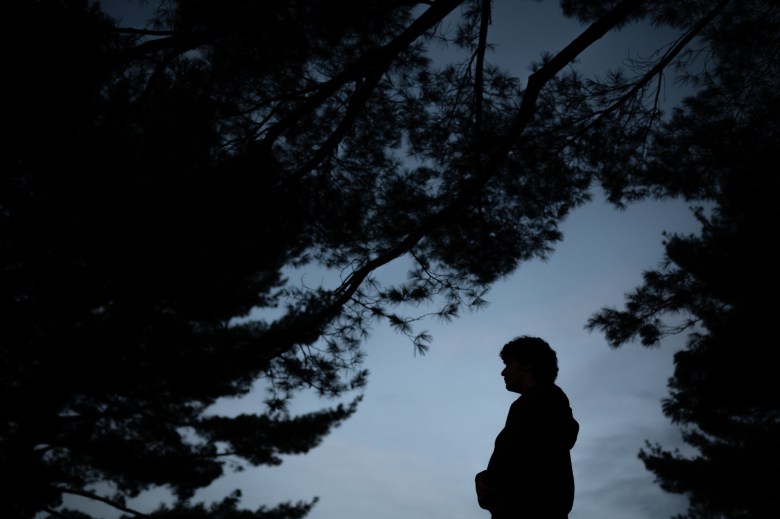
Sam: I kind of challenge it sometimes, you know, like my parents, like, they hate the fact that I grew out my hair, but I grew out my hair ’cause I’m like, I like growing it out.
Mm-hmm. Yeah, for sure. Like, I don’t, I don’t hate doing the things that I just said, you know, ’cause like my parents, they only have me now ’cause my sisters are not like living with us anymore.
But even like my family specifically, I’m not gonna lie, they’re, my parents are more open-minded, I’d say, than a lot of Arab people are because they treated me and my sisters the same.
Like if my sister can’t go out, like I can’t go out, and because me and my sisters have a huge age gap, we never like lived together to the point that we went out together. But like women in general in Arab society are, like, you stay in the house. Like you have to be modest and like not go out. You can’t go out. There’s like men on the streets, like all this kind of stuff, but my parents didn’t think about it like that. They were just kinda like, if Sulaf, my sister, can’t go out. Sam can’t go out.
Jourdan: Sam lives in Squirrel Hill with his parents and his on-again, off-again roommate Lola the Labrador. Sam watches Lola for his cousin sometimes.
Sam: Yeah, so my house. If you walk in, you could just mistake it for like a normal American’s house, I’m not gonna lie. But there’s definitely music. I’ll say that my parents are always on like WhatsApp watching videos on max volume with, like, music. And there’s this one instrument called an oud, which is kind of like a guitar.
It’s like a bigger, more oval-shaped guitar. And it’s a very, it’s like a staple of Yemeni music. I hear it all the time and whenever we had a friend of my dad’s over, he would play an oud and it was, I love how it’s like, it’s very beautiful, so it’s very much like also a capella, kind of just like your voice kind of music that I hear throughout the house.
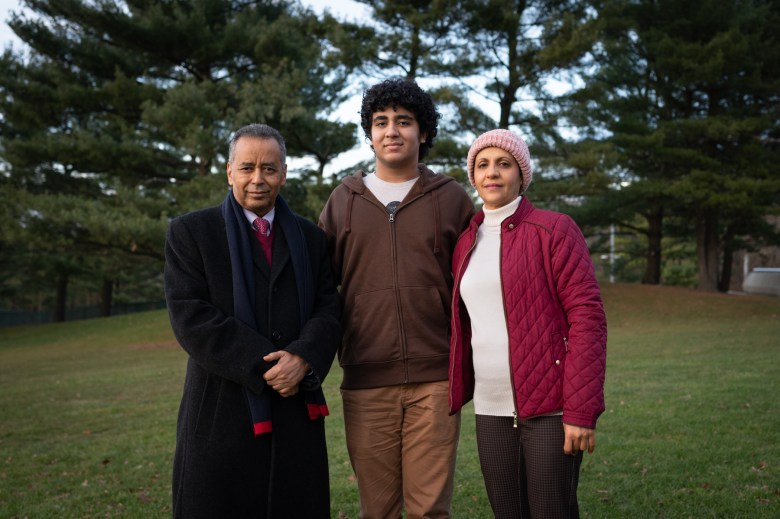
Jourdan: Growing up, Sam has often compared his family to other non-immigrant families he knows.
Sam: I feel like I’ve done so much to help them understand kind of like what’s going on. Like how do people think here? How do parents treat their kids here? And like I’m always comparing like American parents or parents of other cultures. I’m like, you know, like they let their kids do this. And like, even if I know like a friend of mine who has the same experience as me and their parents treat them differently, I’m like, you know, like, look, look at this parent and look how, you know, they handle this situation. And I feel like that’s kind of where my little kid mind comes out, you know, where I’m kind of like, please let me do this.
I feel like they’re very protective. My parents and I feel like their main focus for me especially, they’ve always wanted me to have a good education. That’s like the thing, that’s what they always talk to me about. We have like occasional talks where we just sit down and like, and they tell me about the main reason that they came here was obviously to escape the war, but also they want me to continue with the education that I have, and they’ve always supported me like academic-wise, and I feel like they did a pretty good job. … Like I’m where I am today. And I’m very proud of that. And I feel like I can’t say that without giving my parents like any credit because that’s like the main reason.
So they’ve wanted me to focus on it so much that I feel like when I wanna do other things, I wanna do something, like, different that’s not very academically wise, you know, like skipping or like, things like that. They’re, they’re like, no. Like, absolutely not, not like, you’re not, you’re not gonna be like the American kids are like, we’re not gonna be that easy. Like, it’s not, you know, like they always, I always tell them, I’m like but you know, like this person’s parent let them do this. And then they’re like, well, we’re not those parents. Like, we’re not. And I’m like, oh well.
Jourdan: Why is education so important?
Sam: Because my dad has seen how the world changes. I feel like he’s realized how, you know, like technology’s taking over, like people are getting smarter and like AI is getting smarter.
And all these things that he hasn’t had before and his generation didn’t have access to. So I feel like he wants me to take advantage of those things because he can’t. And I wouldn’t say he like pressures me to do the things I do. Like I very much have a say in what I want to do. Like, he’s always, always, always reminding me like Sam, try this out.
Yes. And I feel like education is so important in my life because if I complete this college degree and get this job that I’ve always dreamed of and my parents have always dreamed of, it’s like they succeeded, like their life is now complete. Like that’s what they tell me all the time. That’s like what they say, they’re like, it’s like it’s worth it that they came here and the amount of things that they risked and the amount of things that they sacrificed for me to come here
Jourdan: Sam says sometimes it’s a lot of pressure, but that he genuinely wants to do the things that his parents also want for him. Like go to college, study computer science, get a decent job and do good in the world.
Sam: I always wonder, I’m like, if I wasn’t like that, if I wasn’t very college-driven, like I didn’t want to go to college, I wanted to do like trade school or like some gap year or something like that, if I wasn’t that by myself, like what would my parents think?
And I, I don’t know what they would think now because like even if they didn’t tell me do that, if they said do whatever the hell you wanted to do since we came here, we don’t care what you do. I think I’d still be the same person that I am today, like academic-wise.
Jourdan: He’s taken about a dozen Advanced Placement level courses, U.S. history, English and French language and composition, and chemistry, just to name a few, but his favorite subject is math.
Sam: I used to not really like it that much, I think growing up, but getting into higher level math, it kind of just clicks for me sometimes, so I, I really enjoy it and it’s a very straightforward kind of subject, so it’s not anything that you can interpret in different ways, like English or history, for example, when there’s more than just one answer or ways that you interpret something. I feel like math is very much just yes or no answer, and I like that confirmation aspect of it.
Jourdan: And he has a few academic awards under his belt.
Sam: I’ve won academic high honor roll. I have AP Scholar, I have the Harvard Book award, which was awarded to me from a vote by the Allderdice faculty, I think for um, high scholar or something of that nature. And it’s, and it’s from the Harvard Alumni Association, I think. I think that’s all of them.
Jourdan: Sam is making himself proud and his parents proud. Not only through his academic achievements, but also through his efforts to give back. At Allderdice, Sam is involved in the Global Minds initiative.
The Global Minds initiative was created to combat cultural intolerance and discrimination through after-school tutoring and discussion programs between English-as-second-language learners and native English-speaking students. It’s an educational and social support system encouraging NES students and ESL students to learn about each other’s cultures.
Sam: It’s kind of bringing ESL students with native English speakers, and we just kind of have a conversation about the difference in culture. If it’s a holiday, we talk about how this holiday is celebrated around the world, whether they celebrate it or not.
Jourdan: Sam is confident that his contributions to GMI are important, but sometimes there’s a performative aspect to advancing the cultural exchange activities that doesn’t sit well with him. Recruiting and incentivizing attending meetings — he’s not feeling it.
Sam: There has to be this incentive that like brings people in that is completely unrelated. But that’s how you’re gonna get people. ’Cause that’s how it works. It kind of feels hard and forced to be like, oh guys, like there’s pizza, so come because realistically and unfortunately a lot of people don’t really care.
Jourdan: Often, native English-speaking students aren’t curious, and ESL students are so immersed in their lives that they don’t wanna stop and share and teach, especially when a great majority of the discussions that these teens are tapped to share those experiences in — their perspectives on cultural exchange and identity — they’re usually for personal gain or some sort of access. Performing for a college admissions application, for awards, for recognition. That’s a part that does not sit well with Sam.
Sam:And like, I’m not gonna lie, like myself, like I’ll call myself out, like sometimes I fall for that kind of thing, and sometimes I’m like but wait, like I realize how important this is. And that’s why I try to go further. I’m very passionate about this thing because it’s made like for me because it’s ESL students and I’m like, I wanna, I wanna give ESL students what I didn’t have, I didn’t this kind of club when I was an ESL student. There’s these kind of conversations that I wanted to be able to give it back. Now that I am in a position where I speak fluent English and I am bilingual, almost trilingual, I think it became so much more important to me. And for some other people, they’re just in a position where it’s just like, it’s not as much for them.
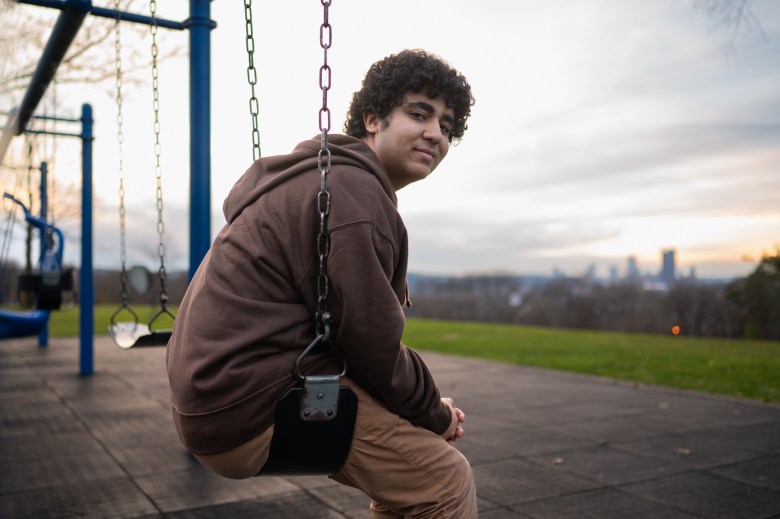
Jourdan: Sam says the club provides community and solidarity and that learning other students’ immigration stories has helped him recognize his own advantages.
Sam: For sure. And I also think it kind of makes you think about your background in a way that’s like, they’re an immigrant, too, but they had such a harder time coming here than I did. And I think that’s so important to know because we’re, we’re not all the same. And even if you come from a different part of the world, like this person had to go through this country, to this country, to this refugee camp to this. And I didn’t have to go through that. And I’m very thankful that I didn’t have to go through that. But also, at the same time, I value people like that because they tell you, like, implicitly that like you’re, you’re not like struggling the most out of everybody here, you know?
Jourdan: Sam has planned to go to college next year. His cousin has been helping him with the application process.
Sam: ’Cause my dad doesn’t know anything, like he doesn’t know how the college process works. He doesn’t know, like, things, like he’s always telling me, he’s always like, oh, go to your cousin ’cause he knows, he’s been through it. And that’s the person that I go to all the time and he takes me on college tours and he’s … I give credit to him, a lot of credit to him.
So I really hope I’m in a good college in a year and I see myself studying computer science and I hope to use that degree, whether it’s computer science or not, it probably might change. But I hope to use that to make a difference in the world, specifically in my community in Yemen, I really want to give back and I’ve always wanted to go back and visit family, so I hope to do that.
Jourdan: Season four of From The Source Podcast is produced, reported and hosted by me, Jourdan Hicks. Halle Stockton is our editor-in-chief. Story editing, sound design and mixing by Liz Reid of Jeweltone Productions.
We continue to interview young people for the podcast as we speak. If you’re curious to learn how you can share your story with us, or nominate a young person, ages 13 to 18 to appear on an episode of From the Source, you can get in touch with me by sending me an email to jourdan@publicsource.org.
PublicSource is an independent nonprofit newsroom in Pittsburgh, Pa. You can find all of our reporting and storytelling at Publicsource.org.
I’m Jourdan Hicks. Stay safe. Be well.
Jourdan is a senior community correspondent at PublicSource. Contact her at Jourdan@publicsource.org.
The Grable Foundation provides funding to support this podcast.

